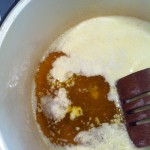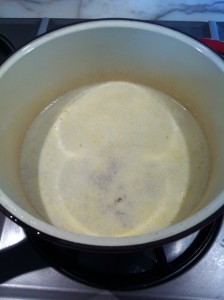 Have you ever had someone suggest that you should try a particular drink or herb for your stress levels?
Have you ever had someone suggest that you should try a particular drink or herb for your stress levels?
Late last year a friend who has studied Ayurvedic medicine for decades told me with a very frank tone and a stern look that, “I was a stressed little kitten and I needed to do three things immediately,”
- Take a decent break/holiday (tick),
- Regularly eat ghee (tick)
- Lather myself with warm black sesame oil every morning before meditating.
(Okay to date I haven’t worked this last one into my routine, and to be honest between children, exercise and work I can’t wrap my head around when this fits, but again the health benefits of black sesame oil are quite remarkable so I’ll make it work somehow!)
My friend would have also added “get adjusted” but being a chiropractor, she knew that I had this sorted. Sometimes we need to add a few other strategies when we have been really taxing ourselves.
 So Why Ghee?
So Why Ghee?
The main reason that people get all lyrical about ghee is primarily because of a highly beneficial short chain fatty acid it contains called butyric acid. Butyric acid was first detected in butter (hence its name), and now ghee.
(Click here to learn how to make Ghee)
Ghee is a kind of concentrated, or clarified butter that originated in India and is commonly used in South Asian cuisine and ritual. Ghee is a food staple in Ayurveda and is the highest known food source of this beneficial fatty acid. (Deepak Chopra MD describes Ayurveda as one of the world’s most sophisticated and powerful mind-body health systems.)
Why do we love butyric acid?
The bacteria or bugs in our intestinal tract actually make butyric acid. The actual microbe that produces butyric acid in the gut – Clostridium butyricum has been used in Asia as a probiotic since the 1940’s.
As a probiotic Clostridium butyricum proliferates naturally in the small and large intestines and one study showed that people with poor gut health have less butyric acid production in the gut.1
 10 Reasons To Switch To Ghee
10 Reasons To Switch To Ghee
Research suggests that some of the benefits of butyric acid2 may include:
- Butyric acid is the primary fuel source for the cells of the colon or bowel, feeding good microbes
- Butyric acid helps digestion and stimulates stomach acid production.
- Butyric acid maintains the integrity of the gastrointestinal mucosa.
- Butyric acid boosts immunity and boosts killer T cell activity and believed to inhibit cancerous tumor growth.
- Ghee helps in vitamin and mineral absorption and is full of fat soluble vitamins A, D, E, and K.
- Helps loose bowel function, regulates abnormal bowel movements and inflammatory bowel conditions and works to adjust water and electrolyte concentration in the intestinal tract.
- Ghee is lactose and casein free.
- Good for the nervous system and the brain.
- Ghee increases insulin sensitivity and helps to reduce hunger levels.
- Supports healthy levels of both good and bad cholesterol, increases energy production and efficiency of energy utilization and may reduce fatty tissue deposition.
We can help our body make butyric acid by feeding the microbes, who make it – ghee.
Another important point is that when cooking at high temperatures, Ghee is safer than butter. Ghee’s smoking point is at 250°C so it is good for cooking at 260°C (500°F) and below.
 Do I still use Coconut Oil?
Do I still use Coconut Oil?
I’ve been asked if I still use coconut oil when cooking or have I switched to ghee entirely? The answer is yes I like to use both, to vary between the two different oils.
I love ghee not only for its flavour but for its health promoting properties. Some foods also feel incredibly nurturing like ‘bone broth’ for example which I’ll share with you soon, but as a condiment ghee’s wholesomeness is palpable. Try it and see if you agree.
. . . . .
Yours in health…
Jennifer Barham-Floreani
Bach. Chiropractic, Bach. App Clinical Science
Registered internationally, no longer practicing as a chiropractor in Australia.
PLEASE NOTE:
Some research suggests being cautious and only using ghee in moderation ideally no more than 1-2 tablespoons per day due to potential cardiovascular impact when consumed in high doses. Remember though more and more studies suggest that it is man made fats such as trans fats that create cardiovascular issues rather then natural fats.
2
- Barcenilla A, Pryde SE, et al. Phylogenetic relationships of butyrate-producing bacteria from the human gut. Appl Environ Microbiol. 2000;4:1654–1661. doi: 10.1128/AEM.66.4.1654-1661.2000.
- Gao Z, Yin J, et al. July 2009. Butyrate Improves Insulin Sensitivity and Increases Energy Expenditure in Mice. J. Diab July 2009 vol. 58 no. 7 1509-1517.
- Patel, N.R. MD. 2012. Indiawest. 30 March 2012. What is Good About Ghee: Science Shows Benefits of Our Ancient Wisdom. Available from: <https://www.indiawest.com/news/3792-what-is-good-about-ghee-science-shows-benefits-of-our-ancient-wisdom.html#cjSJW2MCkfvWgJEM.99>. [23 November 2013]
- Remedios, T. 2012. Healthmeup. 8 November 2012. Health Benefits of Pure Ghee. Available from: <https://healthmeup.com/news-healthy-living/health-benefits-of-pure-ghee/17397>. [23 November 2013]
- The George Mateljan Foundation. 2001. The Worlds Healthiest Foods: What are the advantages and disadvantages of butter and ghee when it comes to cooking? Unavailable. <https://www.whfoods.com/genpage.php?tname=newtip&dbid=9>. [23 November 2013]
3 Trivedi, T. 2013. 2013. “’Ghee’ and its many benefits”, The Times of India, 31 October. Available from: <https://articles.timesofindia.indiatimes.com/2013-10-31/food-reviews/30474131_1_oils-high-smoke-point-high-cholesterol>. [23 November 2013]





